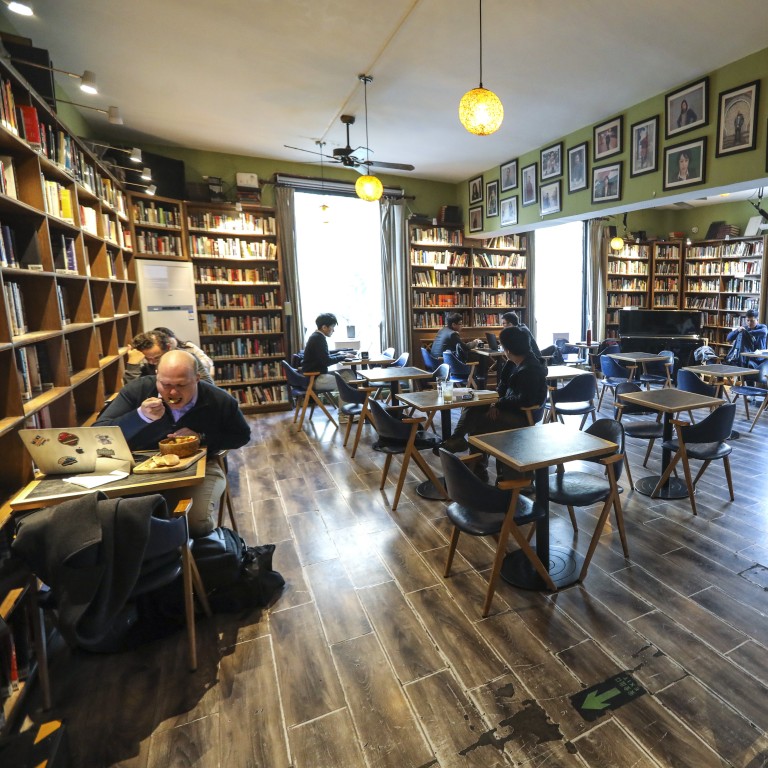
Coronavirus: China’s private bookstores struggling to survive as sales drop 90 per cent, stores remain closed
- China has over 70,000 brick-and-mortar bookstores, but they are among numerous small and medium-sized enterprises struggling due to a lack of customers
- The virus is a further blow to the industry that was already under pressure from online rivals, as well as a growing trend of reading books on electronic devices
During a one-hour live stream, two members of staff circled around the children’s section of an empty bookstore in the eastern Chinese city of Hangzhou, flipping through illustrated books for dozens of online viewers.
At one point, the female member of staff who was holding the camera picked up Forever Young, a picture book by American singer-songwriter Bob Dylan, and said: “I love this book, and I highly recommend it. Fellow watchers, if you are interested, I can add you to our readers’ group on WeChat.”
Even if all of our bookstores reopen, and our business is like what it is now, then we won’t be able to stay in business after two to three months
Owspace, originally from Beijing, operates four stores in China, but only one store in a shopping centre on the eastern side of the capital city has opened for business, although daily traffic is down to around 10 per cent, with sales dropping 90 per cent accordingly.
“Even if all of our bookstores reopen, and our business is like what it is now, then we won’t be able to stay in business after two to three months,” said Wu Yanping, a manager at Owspace, who added that around 40 per cent of Owspace’s revenue comes from book sales.
Owspace’s Hangzhou store, its biggest at 2,800 square metres (30,100 sq ft) and its major revenue source, has yet to confirm a date when it will reopen even as the city slowly returns to normal.
A recent survey covering more than 1,000 physical bookstores across China in early February revealed that more than 90 per cent had no revenues.
Unlike state-owned bookstores that have wide distribution and supply networks and have benefited from allowances to delay payments to suppliers, most small and medium-sized bookstores do not have the same luxury, and many have no other sources of revenue outside book sales.
The survey said that a third of small-scale bookstores with expenditures of less than 500,000 yuan (US$71.400) per month would face serious cash flow problems if they remained closed for one month or if revenues did not improve quickly once they reopened.
The recovery of physical bookstores since 2013 will be declared over, and there will be a large-scale emergency adjustment and even the closing of small and medium-sized physical bookstores in the future
“The recovery of physical bookstores since 2013 will be declared over, and there will be a large-scale emergency adjustment and even the closing of small and medium-sized physical bookstores in the future,” said Zeng Feng, the co-author of the survey.
The central government started subsidising bookstores in 2013, recognising their social and cultural value, and at the end of 2019, China had more than 70,000 brick-and-mortar bookstores, compared to 14,000 in the United States, according to official data. Last year, 4,000 new stores opened, while more than 500 closed.
“Quite a few bookstores worry that the virus could change consumption behaviours in the long term,” Zeng added. “The overwhelming majority of people who really love books are already consumers of online platforms. If physical bookstores lose even more customers, the business environment for bookstores focused on the humanities and social sciences will be increasingly difficult.”
Like Owspace, 1200bookshop in the city Guangzhou in southern China has suffered amid the virus with more than half of its seven stores closed, with sales down to around 10 per cent for those that have reopened for business.
“For six years, the 24-hour 1200bookshop main store has never closed shops at night, but now it has turned off its lights at night. We are very worried about this. If this virus lasts longer, the lights will be out in the daytime as well,” Liu Erxi, owner of 1200bookshop wrote in a post on social media.
“I contacted the landlord and tried to get rent cuts, but she has not responded to me, and this worry has become more serious. For now, all 1200bookshop stores have not received any rent reductions, so we must save ourselves and seek support from friends who love and recognise 1200bookshop.”
Liu has started to sell gift cards ranging from 300 yuan (US$43.7) to 1,000 yuan as well as tote bags in a bid to boost cash flow.
We haven’t taken any measures to ask for help. Indeed, the longer the store is closed, the greater the economic pressure will be
“Whether it’s paying rent in instalments, or less rent, it would certainly help,” Wu said.
In the city of Wuhan, the epicentre of the coronavirus in the province of Hubei, Cheng Lei has operated a small bookstore since 2014, but Jingzizai has now been closed for almost a month.
“But how does this compare to those who face life and death on the front line? Even if the store is eventually eliminated by the market, we hope to respect the economic laws.”
Purchase the China AI Report 2020 brought to you by SCMP Research and enjoy a 20% discount (original price US$400). This 60-page all new intelligence report gives you first-hand insights and analysis into the latest industry developments and intelligence about China AI. Get exclusive access to our webinars for continuous learning, and interact with China AI executives in live Q&A. Offer valid until 31 March 2020.

